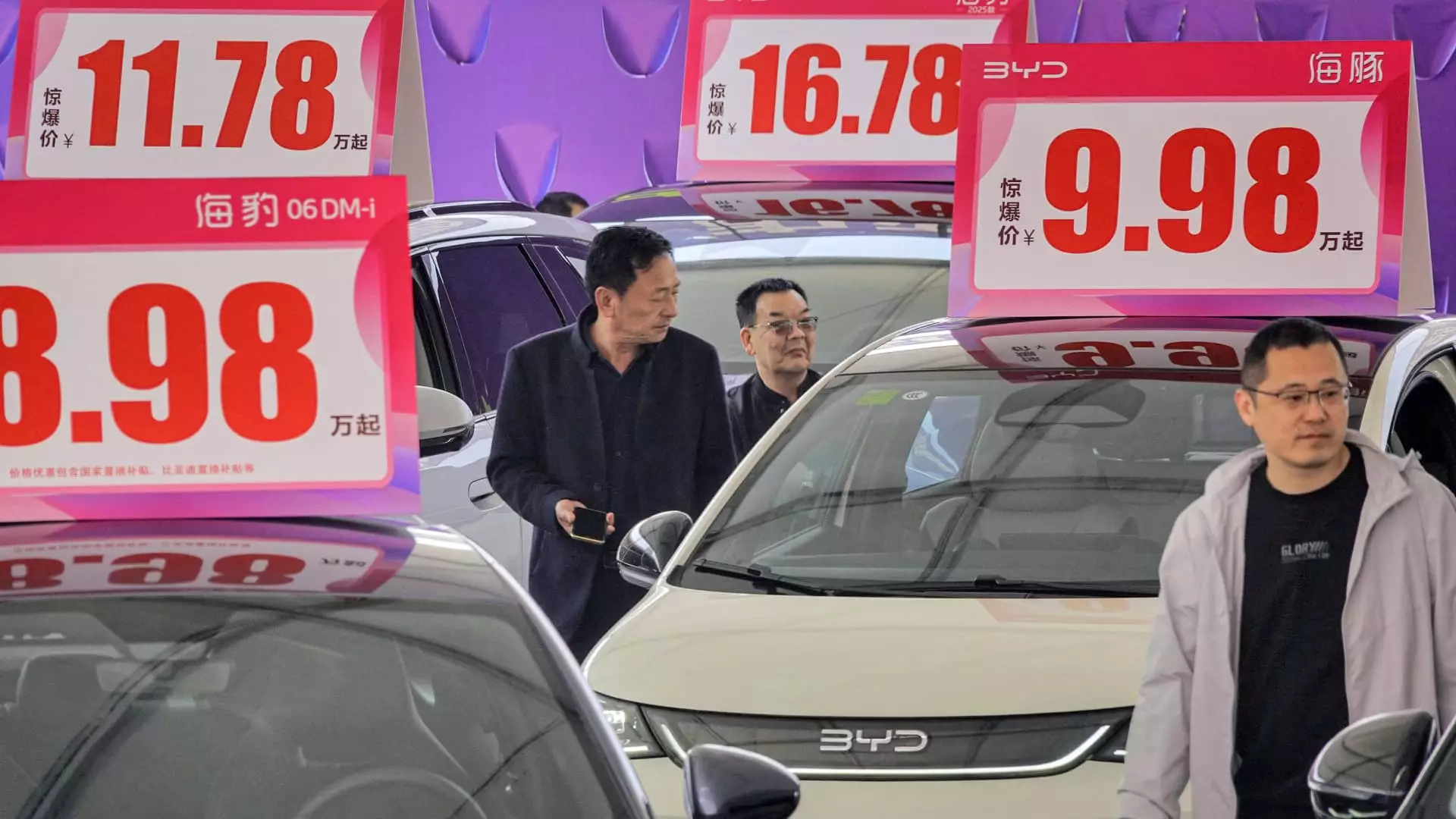The electric vehicle landscape in China is currently in turmoil, and BYD has ignited a fierce price war that could alter not only the domestic car market but also the global automotive sector. Announcing discounts reaching nearly 30% on popular models like the Seagull compact, retailing now at an astonishingly low 55,800 yuan ($7,750), BYD is challenging the status quo and forcing competitors to reconsider their strategies. The ramifications of this move extend beyond mere consumer appeal; they evoke serious concerns regarding market sustainability and the viability of smaller automakers who may be unable to match such aggressive pricing strategies.
Zhong Shi, a respected analyst from the China Automobile Dealers Association, remarked that the industry is experiencing unprecedented anxiety. This disturbance can be likened to a seismic shift, exposing the fragility of a system that has been artificially propped up by state policies and subsidies. The aggressive discounting reflects not only internal competition but also a deeper economic malaise engulfing an economy struggling with slow growth and wavering consumer demand. This kind of price slashing is symptomatic of a broader deflationary trend that threatens to derail an already shaky recovery from setbacks spurred by global disruptions such as the pandemic and geopolitical tensions.
Beyond Competition: A Call to Examine Economic Fundamentals
Yet, the urgency of re-examining these economic fundamentals is underscored by a growing dependence on a supply-driven model. Morgan Stanley’s Chief China Economist, Robin Xing, warns that despite the rhetoric for economic rebalancing toward consumption, a supply-driven mindset remains dominant. The market isn’t merely adjusting prices; it’s racing toward a precarious cliff that could see major players falling out if such practices continue unchecked. The prevailing logic supports the view that savings in this price-driven competition lead to deflation rather than genuine growth.
This is not just a fleeting market trend; it is a clarion call for a reconsideration of how the automotive sector operates within the broader economic context in China. With price cuts dominating the industry narrative, the focus is diverted from truly enhancing consumer experience or product quality. Instead, it promotes a race to the bottom, where the ultimate casualty is innovation.
The Echoes of Past Crises: Lessons from the Real Estate Sector
The specter of the “Evergrande crisis” looms large as comparisons are drawn between the burgeoning electric vehicle (EV) industry and a bloated real estate market that once led to catastrophic financial repercussions. Wei Jianjun, chairman of Great Wall Motors, aptly warned that the auto industry stands on similar shaky ground. Much like Evergrande, which struggled under the weight of excessive debt amid regulatory crackdowns, the EV market’s future hinges on sustainable practices and prudent financial management.
Recent reports of manufacturers exerting pressure on dealers to maintain cash flow only add fuel to this fire. Such practices do not instill consumer confidence nor foster a healthy business ecosystem. The internal machinations of price cutting and pressure on supply chains place both consumers and dealers in tenuous positions. The threat of financial derailment looms ever larger, particularly for smaller enterprises that cannot weather the storms whipped up by market volatility.
Global Implications: Trade Tensions and the Shift in Power Dynamics
As Chinese automakers race to expand their global footprint, the international landscape is increasingly reflective of tensions simmering over trade policies. Global markets are already responding to these developments, with the European Union and the United States enforcing heavy tariffs on imports of Chinese-made electric vehicles. These protective measures could be seen as an attempt to insulate domestic manufacturing against an influx of cost-competitive products buoyed by state support.
The competitive tide has not only reshaped the domestic market but has also thrust the global automotive industry into a defensive posture. The EU’s tariff strategy, while a necessary maneuver, may ultimately prove ineffective in curbing the influence of Chinese brands, as evidenced by BYD outselling Tesla in Europe—a remarkable benchmark that signifies a shift in consumer preferences toward Chinese EVs.
Acknowledging the realities of a networked global economy, the fundamental question looms: Can the interests of consumer affordability and innovation exist harmoniously? The current trajectory taken by Chinese automakers suggests that short-term gains are prioritized, potentially stifling innovation and leading to a future where consumers may find themselves trapped in a cycle of subpar offerings masked by aggressive pricing.
The Future of the Chinese Auto Industry is at a Crossroads
The state of the Chinese electric vehicle market is a clear indicator of how deeply intertwined economic policies and industry practices can become. The current techniques employed by major players provoke paranoia among smaller competitors and present a delicate balancing act that policymakers must navigate carefully. The system that currently promotes bargain basement pricing reflects a much larger conversation about the sustainability of growth and the values that should guide it.
What remains to be seen is whether the industry’s leaders will heed the lessons of the past and adapt before facing a crisis that could reshape not only the Chinese market but global automotive dynamics as well. With the stakes higher than ever, the narrative of discount-driven sales may force a real evolution in how automotive brands define their identities and relationships with consumers and competitors alike.

